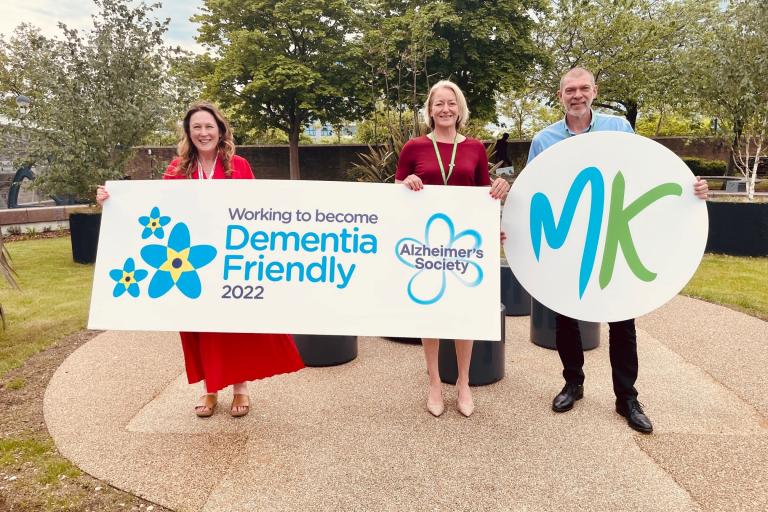
(Pictured above, from left) Cabinet Member for Adults, Housing and Healthy Communities, Cllr Emily Darlington with MKC Director of Adult Services, Victoria Collins and Group Head of Commissioning, Mick Hancock
This week (16 – 22 May) is Dementia Action Week and Milton Keynes Council is highlighting the importance of early diagnosis and the network of local support on offer.
More than 1,600 people are currently living with dementia in Milton Keynes, and that figure is expected to rise to more than 4,000 by 2030. Diagnosis rates have fallen to the lowest level in five years and new data from Alzheimer’s Society suggests that as many as 325,000 people in England may have undiagnosed dementia.
The council, in partnership with Alzheimer’s Society, has committed to make Milton Keynes a dementia friendly city. Supported by local organisations including Thames Valley Police, the NHS and Dementia UK, the partnership aims to ensure that MK is a good place to live for people with dementia and those who support them.
Last year, the council introduced two Admiral Nurses to support families across the borough. To date, these specialist dementia nurses have already helped hundreds of local families who have been affected by various forms of dementia including Alzheimer’s disease.
MK’s Admiral Nurse team works alongside the Council commissioned Dementia Information and Support Service which is staffed by trained dementia support workers who offer help to residents including those who are newly diagnosed.
Admiral Nurses can be contacted for information and advice by email at AdmiralNurseTeam@milton-keynes.gov.uk. You can also speak to our Admiral Nurses by calling 01908 253 772.
Cabinet Member for Adults, Housing and Healthy Communities, said: “With diagnosis rates falling to a five-year low, we want to reassure anyone living in MK with undiagnosed dementia that help is available. Early diagnosis helps both the person and family members to learn about the disease, set realistic expectations and plan for their future together. If you or a loved one have concerns, it’s worth getting in touch to understand the local support that is available.”
MK Council was one of the first planning authorities to introduce a development framework to ensure new homes and communities are built to ‘dementia friendly’ standards. The new Supplementary Planning Document (SPD) sets out strict guidelines for developers, to ensure that they build new homes and communities that meet the needs of people living with dementia in the city. This could include accessible housing schemes within a short distance of local amenities and public transport, streets and footpaths that are easy to navigate, as well as clear signage and sensory public gardens.
The local partnership is also establishing dementia-focused community groups across MK. Working alongside other community organisations, these groups will look at existing local facilities such as cafes, shopping areas and GP surgeries and how they can be made more dementia friendly.
